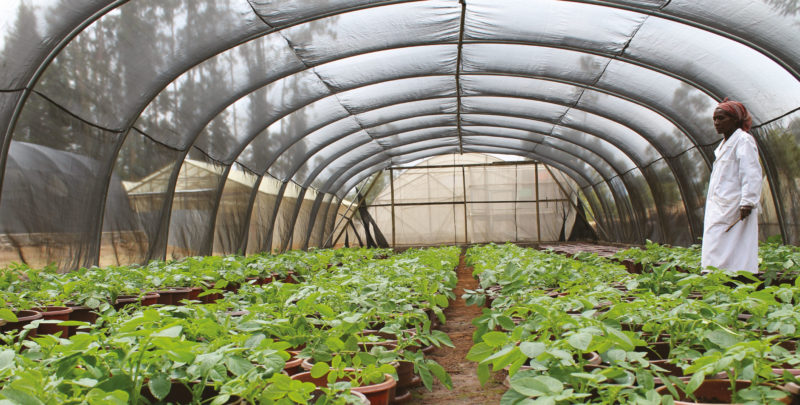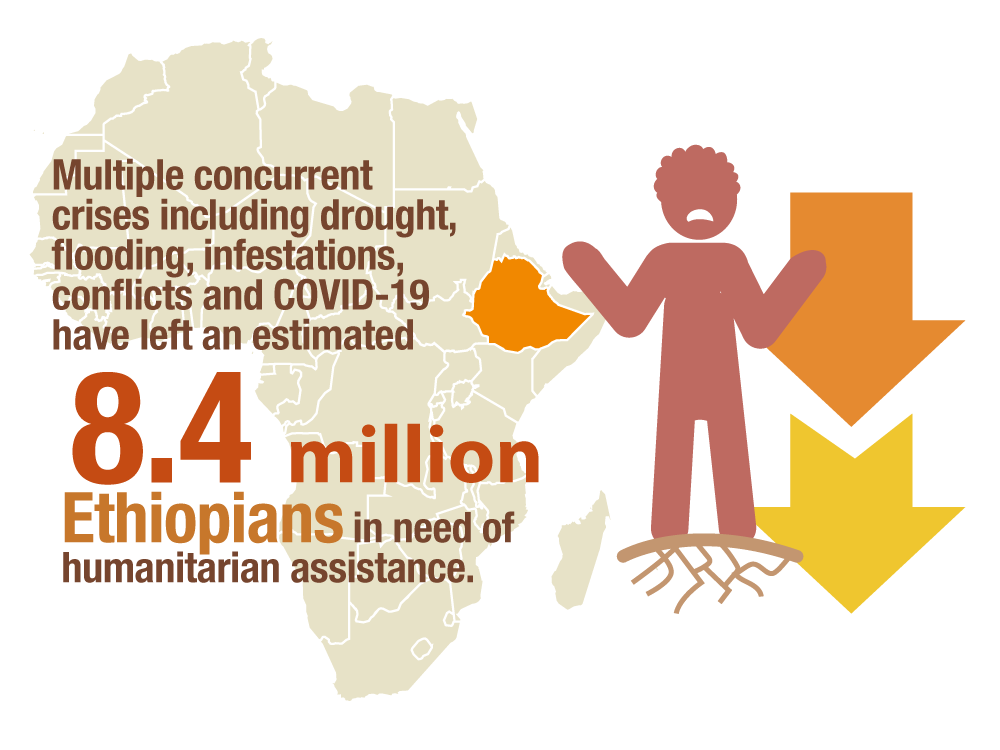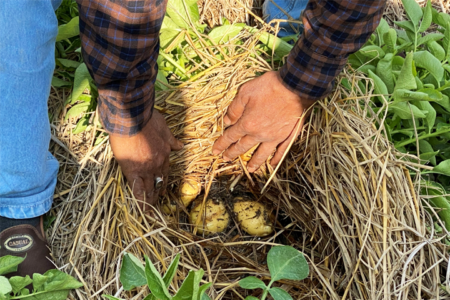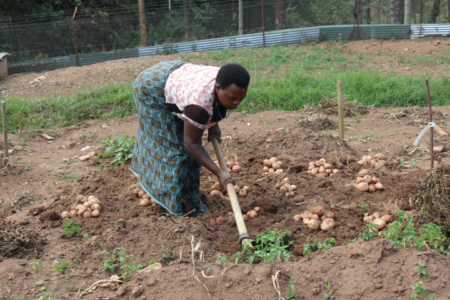
Stabilizing food production and access to nutritious foods through capacity building in the SNNP, Oromia, and Amhara regions.
This project aims at improving the agronomic and nutritional skills and knowledge in three regions of Ethiopia most affected by multiple crises, making use of high-yielding biofortified orange-fleshed sweetpotato as well as improved and resilient potato varieties through employing proven delivery approaches and tools.
Background
Multiple concurrent crises including drought, flooding, desert locust infestations, prolonged impacts of past poor agricultural seasons, conflicts and COVID-19 have left an estimated 8.4 million Ethiopians in need of humanitarian assistance. The Southern Nations Nationalities and Peoples (SNNP), Oromia, and Amhara regions are among the worst affected. Proven potato and sweetpotato varieties and approaches can help stabilize food production and expand access to nutritious foods, and strengthen self-reliance, reducing the need for future emergency responses.
Potato and sweetpotato are especially suited for emergency responses and resilience building, as they produce more calories per hectare than most food crops, can be harvested within three to four months from planting, and are resilient to destruction from locusts. Since 2016, more than 240,000 people in drought-affected Amhara and SNNPR have sustainably increased their food production and improved their diet quality with improved potato and biofortified sweetpotato varieties, which are an excellent source of vitamin A. This success has been enabled by rural enterprises and local government working together.
With this project, CIP proposes to expand this successful work to new communities at great risk of food insecurity, using potato and sweet potato varieties released in 2019, , and appropriate agronomic and utilization technologies delivered with proven approaches.
Objectives
This project aims to contribute to improved food and nutrition security of farming households affected by multiple concurrent crises in Amhara, Oromia and SNNPR regions and to support their transition to self-reliance through the following objectives:
- To provide vulnerable farm households’ access to planting material of nutritious and resilient potato and sweetpotato varieties;
- To enable multipliers to produce and deliver seed potato and sweetpotato vine cuttings;
- To improve agronomic and post-harvest skills;
- To improve nutrition knowledge and disseminate technologies to enhance nutrition outcomes from potato and sweetpotato for vulnerable households including children under two years of age; and
- To strengthen the capacity of local institutions and rural enterprises to provide sustained access to potato and sweetpotato-related productive inputs and services.
Approach
The project will be managed by the CIP Ethiopia Country Office, which will take responsibility for its delivery, while activities are planned and implemented jointly in food insecure and crisis-affected areas pre-selected by the Bureau of Agriculture and Natural Resources. Additional collaborators include regional agriculture research institutes, seed companies, Agriculture Technical and Vocational Education Training Institutes, Farmer Training Centers (FTC), seed producers’ cooperatives, and farmer groups.
Quality planting materials of nutritious, resilient, highyielding potato and sweetpotato varieties will be provided to vulnerable farm households. The project will support local planting material multipliers through FTCs, farmer cooperatives, and individually. To support seed production, technological innovations such as small-scale irrigation and rainwater harvesting structures will be installed at seed multiplication sites in selected drought-prone districts; extension staff and farmers will receive training in best production and post-harvest practices; seed multipliers will be trained in production and delivery of seed potatoes and sweetpotato vine cuttings and post-harvest management, including construction of low-cost storage.
The project will collaborate with the Regional Bureaus of Health to engage health and extension workers to conduct nutrition support in participating communities, especially with women farmers. They will be trained in the principles of healthy diets, young child feeding, and other nutrition needs. Another activity will be creating demand and building skills for the effective use of potato and sweetpotato to improve household nutrition, including cooking demonstrations for these crops along with other awareness raising activities. Healthy baby tool Kits will be distributed to households with children under two years of age to support the effective use of sweetpotato for infant and young child nutrition.
The capacity of local institutions and enterprises will be strengthened through jointly designing and implementing training of trainers and technology delivery activities, as well as through monitoring and evaluation and quarterly review and learning meetings.
Expected outcomes
Expected outcomes are an increase in potato production of at least 7,200 mt, and sweetpotato production of at least 6,480 mt; improved capacity of farmers and seed enterprises to sustainably meet demand for quality seed potatoes and sweet potato vines, for future expansion of production to 100,000 mt; an increase in the number of months that beneficiary households will be food secure, and increased diet diversity of at least 216,000 people.
Moreover, local institutions and enterprises will be prepared to sustainably provide agricultural inputs and knowledge support to vulnerable communities during future crises.
| Key outcome | Targets |
| Access to planting material |
|
| Additional quantity of crops produced | Potato: 7,200 mt; Sweetpotato: 6,480 mt
Total: 13,680 mt |
| Agronomic and post-harvest skills |
|
| Nutrition knowledge and supportive technologies disseminated in food insecure households including children < 2 |
|
| Capacity and performance of local institutions and rural enterprises |
|
| No. of people improving their food security and diet diversity (of which children <5) | Potato: 108,000 (25,000); Sweetpotato 108,000 (25,000)
Total: 216,000 (50,000) |
Contact
Setegn Gebeyehu
CIP
setegn.gebeyehu@cgiar.org
Thanks to our donors

Partners: CIP, Bureau of Agriculture (BoA), Bureaus of Health (BoH), Amhara Regional Agricultural Research Institute (ARARI), Southern Agricultural Research Institute (SARI), Oromia Regional Agriculture Research Institute (ORARI), Haramaya University (HU), Selected Agriculture research institutes, Selected Farmer Training Centers (FTC), private sector seed companies, Agriculture Technical and Vocational Education Training Institutes (ATVET), seed producers’ cooperatives and farmer groups, Hawassa Agricultural Research Center (HARC), Dessie Tissue Culture, Adet Research Center.




